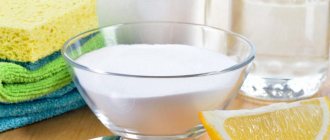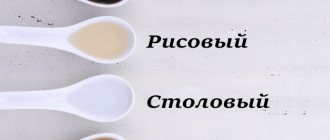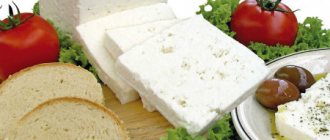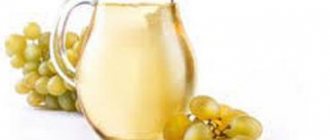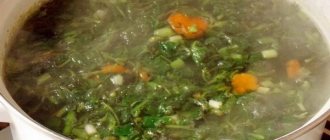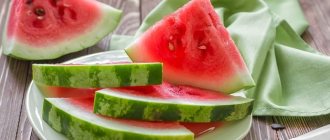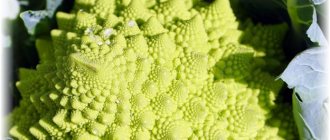| What can you replace apple cider vinegar with? | Description |
| Lemon juice | When looking for an alternative to apple cider vinegar, many people prefer to choose fresh lemon juice. This is quite suitable for preparing fresh salads, dressings for meat and fish. Lemon juice can be used in baking to quench soda. |
| White wine | When preparing main dishes, you can use white wine instead of apple cider vinegar. It will provide the necessary acid and certainly will not spoil the taste. |
| Table vinegar | It is quite possible to replace apple cider vinegar with table vinegar in a recipe, but you should just keep in mind that the concentration of the product is much higher. Be sure to dilute it with water to obtain a 3% solution. Using a concentrated product can be harmful to health and spoil the dish. In many bread baking recipes, apple cider vinegar is present; you can safely replace it with table vinegar, but at the same time reduce its amount. |
| Wine vinegar | Wine vinegar becomes a worthy replacement for apple cider vinegar in marinades and various sauces. Its addition changes the usual tastes, making them much more delicate. |
| Homemade apple cider vinegar | Many people prefer to make their own apple vinegar. The advantage of this method is that the resulting product has no preservatives and is completely safe for health. |
Apple cider vinegar is a product that became very popular in the CIS countries just a few decades ago. Many people learned about its benefits for the body from the book “Honey and Other Natural Products” by D. W. Jarvis, where he talked about various ways to use the product, calling it a panacea for many diseases. Since that time, this particular product has been used in many recipes.
If you don’t have it in the kitchen during the cooking process, you should know how you can replace apple cider vinegar so that the dish acquires the desired taste.
Lemon juice
The fresh sourness found in lemons, other citrus fruits or even fresh berries is a real boon when preparing salads or desserts.
This natural substitute is undoubtedly not used for canning or baking, but adding lemon juice to salad, fish and even meat is an excellent solution and replacement for apple cider vinegar.
What can you substitute for white and red wine vinegar?
What can you replace wine vinegar with? This question arises in cases where this aromatic dressing is included in the recipe of a dish, but is not on hand. Grape sauce is replaced with other products that have a similar composition and taste.
Most often, other types of acid are used as a replacement - regular table or apple cider vinegar, lemon or lime juice. You can also use grape wine. But it needs to be added in small quantities, as the taste of alcohol can completely ruin the dish.
We recommend: Recipes for delicious marinades with vinegar for chanterelles
If the cook wants to give the dish an appetizing and rich red-ruby hue, you can use grape juice for dressing. But in terms of concentration, it is much weaker than vinegar, so its amount needs to be tripled. For a richer taste, grape juice can be diluted with white wine and various spices can be added.
Is it possible to replace wine vinegar with regular table vinegar?
The worst substitute is considered to be ordinary table vinegar . It is recommended to use it only in the most extreme cases, when you don’t have grape juice, red or white wine or lemons on hand.
If the kitchen only has vinegar essence with a concentration of 70%, it is used in the following proportions :
- For 3% dressing – 1 teaspoon of essence and 22 teaspoons of water.
- For a 6% dressing – 1 spoon of essence and 11 spoons of water.
- For 9% dressing – 1 spoon of essence and 7 spoons of water.
When using regular table vinegar, you need to be guided by your taste preferences.
Can I replace it with apple juice?
White and red wine vinegar are made from a natural product – grape berries. Therefore, the best replacement for this dressing would be natural apple cider vinegar. But when using it, it is necessary to take into account the acid concentration.
Wine vinegar has a 9% acidity concentration , while apple vinegar has 3-6% for a natural product and 9% for a synthetic product. Therefore, store-bought dressing is added in quantities similar to wine. When using natural acid, the amount must be increased depending on the concentration indicated on the label.
Can I substitute balsamic?
Replacing wine vinegar with balsamic vinegar is extremely rare . This aromatic product is distinguished by its extremely high cost and bright, self-sufficient taste. The process of making natural dressing is very complex; it must be infused in oak barrels for at least 10-15 years. This explains the high cost of balsamic vinegar.
In the preparation of balsamic, a whole bouquet of herbs is used , each of which has its own unique, specific taste and aroma. It does not go well with all products and can easily “overshadow” their natural taste - all you need to do is add just a few extra drops of dressing.
Can lemon juice be substituted?
Freshly squeezed lemon juice is a great substitute for grape vinegar . You can also use lime. In order for the taste of the dressing to fully match the spicy dressing, the juice must be diluted with red, white wine or natural grape juice.
Vinegar or citric acid for preservation
Pickling cucumbers, tomatoes and other vegetables with citric acid is widely popular in the culinary field. This recipe is great for people who are allergic to vinegar.
Vinegar and citric acid have several contraindications for use:
- diseases of the digestive tract;
- diabetes;
- renal dysfunction;
- increased level of stomach acidity;
- severe forms of nervous disorders;
- arterial hypertension.
In such cases, it is recommended to avoid using these preservatives as a preservative .
What's better
Canning with citric acid is steadily popular among housewives. Thanks to this component, the preparations are preserved for a long time, acquiring an unusual, original citrus flavor and pleasant aroma.
Each of these products has its own specific features:
- Citric acid is a product obtained as a result of chemical processes. Accelerates the removal of harmful waste and toxins from the body, stimulates metabolism, promotes weight loss.
- Vinegar can be natural or synthetic. It has several varieties, including table, apple, grape, rice, balsamic. Natural vinegar is good for health, as it contains a large amount of vitamins, micro- and macroelements.
We recommend: Delicious recipes for manna with kefir
For tasty winter preparations, it is best to use a product of natural origin - it is not only an excellent preservative, but also a healthy product.
Citric acid: how to use for canning
Citric acid is used for canning tomatoes and cucumbers . This is a natural preservative - only lemon is used to prepare it.
The quantity depends on the volume of the jars in which vegetables are preserved . For containers with a volume of 1 liter, the recommended amount of citrus preservative is about ½ teaspoon or a little more.
For a 2 liter container you will need at least 1 teaspoon of the product ; for a 3 liter jar the recommended amount of preservative is a heaped teaspoon.
How to preserve cucumbers and tomatoes with citric acid instead of vinegar
How exactly to replace table vinegar with citric acid and in what quantity to add it depends on the type of winter preparation. Recommended proportions :
- cucumbers in a 1 liter jar - 1 liter of water, 2 tbsp. l. salt, 1 tbsp. l. granulated sugar, 1 tsp. citric acid;
- tomatoes in a 1 liter jar - 1 liter of water, 2 tbsp. l. granulated sugar, 1 tsp. citric acid;
- assorted vegetables in a container 1 l - 1 tbsp. l. granulated sugar, 2 tbsp. l. salt, 1 tsp. citric acid.
Preserving cucumbers and tomatoes with the addition of lemon preservative is not particularly difficult . Add peppercorns, cloves and other spices to your taste to the bottom of a pre-sterilized jar, add garlic cloves, carrots, dill, currant leaves and fill the container with tomatoes. A marinade is prepared separately from water, granulated sugar, salt and citric acid, which is poured over the vegetables.
Use in cooking
The product is often used by chefs in many countries around the world. The taste of wine vinegar is familiar to many people. Typically, the aroma and taste of the product are ideal for preparing marinades. It is recommended not to forget that adding vinegar to vegetable salads makes them much tastier.
Products that wine vinegar should not be combined with:
- Milk;
- Beans;
- Fried potatoes.
Violation of these tips can cause digestive system disorders.
What to do if you don’t have wine vinegar, but the recipe calls for it. What can be replaced
Many homemade dishes include red or white wine vinegar . It is used in the preparation of meat, fish, vegetable dishes, and baked goods. If you don't have this ingredient, don't worry - you can replace it with lemon or lime juice, other types of vinegar, grape juice or wine. They have similar taste properties and give the dish an original, bright flavor.
We recommend: Delicious summer “Okroshka” - a traditional recipe
In the marinade
How can you replace wine vinegar when preparing delicious sauces and marinades for meat and fish dishes? This question arises for many housewives who do not have grape dressing.
The best option would be red wine - it goes harmoniously with meat and poultry, giving dishes a piquant sweet and sour note. You can add softer white wine to fish marinades.
An equally tasty substitute would be orange, pineapple, lime, cranberry, pomegranate or plum juice or kiwi puree. They combine especially well with meat kebabs, making them more tender and refined.
If you have natural balsamic vinegar , using this elite product you can prepare an excellent marinade for any meat and fish dishes, as well as kebabs.
In conservation
For canning, it is best to use the usual table vinegar, vinegar essence or citric acid . The essence must first be diluted with clean water - to obtain a dressing with a 9% concentration you will need 1 teaspoon of the product and 1 spoon of water.
Citric acid is often used as a preservative. It gives the preservation a pleasant sour taste and ensures long-term storage . The acid can be replaced with an aspirin tablet added to the jar with the preparation before rolling it.
If you want to get a winter preparation with an unusual, interesting taste, use dry white wine instead of grape vinegar , which gives canned vegetables, fruits and berries a special piquancy. It is better not to use red wine, as it will completely change the taste of the preserve.
In borscht
Wine vinegar is used in the preparation of borscht to preserve the beautiful ruby color that beets have. The best replacement option is citric acid or fresh juice squeezed from a lemon. These products help the broth retain its appetizing color, do not have any effect on its taste and aroma, but impart a light, barely noticeable sourness.
When adding freshly squeezed juice, you will need no more than one tablespoon of this dressing. If you decide to use citric acid, a pinch will be enough.
We recommend: Features of sterilizing jars with vinegar at home
In salad
A fresh vegetable salad will become more refined and original with a wine vinegar dressing. If you don’t have it on hand, freshly squeezed lemon or lime juice will be an equally tasty alternative .
The main condition when using citrus juice is a minimum amount of dressing . The juice is very concentrated, it can completely overshadow the taste of the salad.
Other salad dressing options:
- Citric acid - 1 teaspoon of acid per 14 tablespoons of water (for vinegar 9%) or 22 tablespoons of water (for vinegar 6%).
- Natural grape juice diluted with dry wine in equal proportions.
- Freshly squeezed lemon or lime juice with the addition of white or red wine, grape juice.
- Soy sauce as a dressing on its own or in combination with fresh lemon juice.
Such dressings go well with vegetables, giving salads lightness and freshness, as well as a pleasant sweet and sour taste.
In baking
Wine vinegar is widely used in the confectionery industry . It is added to pies, bread, cakes, muffins, pancakes and other baked goods. Thanks to this dressing, which extinguishes the soda, the dough becomes light and “airy”. Natural grape vinegar has a pleasant, mild taste that does not have any effect on the taste of baked goods.
As an alternative, the most commonly used is citric acid diluted with water (1 teaspoon per 14 tablespoons of pure water). You can also use freshly squeezed lemon juice, apple cider vinegar, dry white wine, 1-2 tablespoons of whey.
Table vinegar (9%) can be replaced with apple cider vinegar.
But you need to understand that apple cider vinegar is sold at 5%, that is, to use it instead of 9% vinegar, you will need 2 times more apple cider vinegar. Instead of 1 tablespoon of 9% vinegar, take 2 tablespoons of apple cider vinegar.
Apple cider vinegar, grape (wine), rice vinegar, balsamic vinegar and others are most often used NOT for canning, but for dishes (borscht, salads, dressings) or marinating meat and fish. Since they still have their own specific taste, introduce them into your family’s diet carefully, because as you know, we are often conservative in our tastes, especially children.
You need to be even more careful if someone in the family has gastritis, ulcers or colitis, as well as
